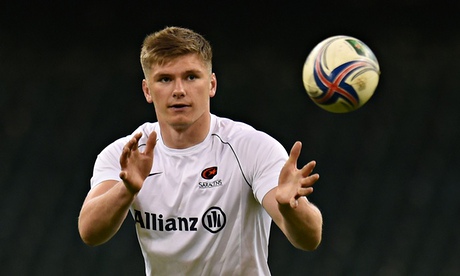
The last Heineken Cup final in its current guise could hardly be a more tantalising heavyweight contest between old and new. In the red corner will be Jonny Wilkinson and Toulon, the retiring hero and defending European champions respectively. In the wolf grey-and-blue stripes will be Owen Farrell and Saracens, the most ferociously dogged of challengers. A compelling variation on kickboxing awaits, with a dash of sumo, cage-fighting and rugby union attached.
It should, of course, be stressed that the number of influential on-field individuals stretches way beyond the head-to-head between two No10s. Billy Vunipola and the barely-fit Steve Borthwick will be pivotal, as will Steffon Armitage and the ever-dangerous Matt Giteau. Yet, like it or not, Wilkinson’s image adorns every promotional poster in a damp Cardiff and Farrell can no more avoid the inevitable centre of attention than live down his own familiar surname. If anyone has the incentive to deny Wilkinson a fairytale finish on his last competitive appearance on British soil, it is his fast-maturing mini-me.
It is necessary to rewind 13 months to the European semi-final between these same two clubs at Twickenham to understand the pair’s practical importance to their respective sides. That day Wilkinson kicked seven penalties and a drop-goal while Farrell’s composure gradually frayed. The latter wryly reminisced on Friday about lying on the ground next to his opponent after the former’s drop-goal had taken Toulon 21-12 ahead with six minutes left. “We realised the game had got away from us. I think my words to him were: ‘There’s no way you got that over.’ He just said: ‘Sorry’.”
Any accession to Twickenham’s throne, though, cannot happen until the dauphin has finally seen off the old French-based king. It is going to take some doing to judge from Wilkinson’s eve-of-match mood: “The thought of leaving this final without a happy ending to the journey is a painful one. Just like the rest of my career this next game is the biggest. Next week doesn’t exist. The last few years don’t really exist either. If things go well for me but not the team it wouldn’t please me one bit.”
A rotten day for Wilkinson, on the other hand, would cement Saracens’ belief they can give their own departing hero, Borthwick, a fitting send-off, assuming their captain defies a “significant” pectoral injury and plays any meaningful part.
It will take guts, the kind of epic defence which ultimately did for Clermont in a memorable semi-final and a tactical masterclass from the increasingly-mature Farrell. “I’ve watched the progression he’s made in the past year ... if he keeps doing that it’s mind-boggling to think where he’s going to be in five years,” says Neil de Kock, his frequent partner at scrum-half who is on the bench for this fixture behind Richard Wigglesworth. “He’s a sponge ... the way he analyses things is brilliant. He’s just getting better and better.”
It is the power of the collective, though, which can elevate Saracens above Toulon’s galácticos and make them the first English side to lift the Heineken Cup since Wasps in 2007. Toulon’s head coach Bernard Laporte had it right on Friday afternoon when he sketched out the prospects of his team emulating Leicester and Leinster and successfully defending their title. “Their strength is their defence, the mobility of their forward pack and individuals at the back like (Chris) Ashton. You can’t be at the top of the English Premiership for months without being an exceptional team. The match against Clermont demonstrated that perfectly.”
No side, certainly, has swept Saracens aside lately and Billy Vunipola, Schalk Brits, Alex Goode and Ashton – the tournament’s leading try-scorer with 11 – have been as good as anyone in their positions over the campaign. The wolf-pack mentality on opposition ball is only one weapon; there is abundant skill, too, from the accuracy of Wigglesworth’s box kicks to the management’s intensive homework. Most of all, though, there is togetherness in adversity and a belief that the Clermont performance was not a one-off.
“We feel our collective spirit is something we can use,” said Goode, having made a flying day-trip from Luton to Cardiff with Farrell and Marcelo Bosch for some last-minute goal-kicking practice.
The only caveat is whether they can continue to withstand Toulon’s relentless physicality deep into the last quarter, when it starts to tell against lesser opponents. “There’s this common view out there about how to beat them, which is to move their big men around and play with tempo,” stressed Mark McCall, Saracens’ director of rugby. “But everyone who has done that has come up short. You need to have other ways of stressing them and taking their energy away.”
In other words, Saracens need to get to Wilkinson and Giteau as much as possible and deny Steffon Armitage the turnovers he thrives upon. If Toulon have a weak link it is probably Sébastien Tillous-Borde at scrum-half and he will also receive plenty of attention. Discipline, though, will be critical. Saracens cannot afford the yellow cards they incurred against Harlequins last week and the referee Alain Rolland, another end-of-season retiree, stands for no nonsense. “It’s obvious they’re going to put pressure on Wilkinson but that happens to any player,” sniffed Laporte. “If they start being violent we’ll win easily because they’ll get red cards.”
Could we ultimately see a repeat of Wasps’ win over Toulouse a decade ago, when the French side dominated for lengthy periods but the English nipped in late? It potentially has that feel, always assuming there is not one last lurking Wilkinson cannonball in store.
“In any sport you have one athlete in a generation who is immense,” insisted Laporte, the former French national coach. “Once after we’d lost at Twickenham I said: ‘We have Zidane and they have Wilkinson.’ I was right. I could talk about him forever.”
Wilkinson’s armour-plated reputation is well deserved but Saracens and Farrell pose bigger threats than most.

